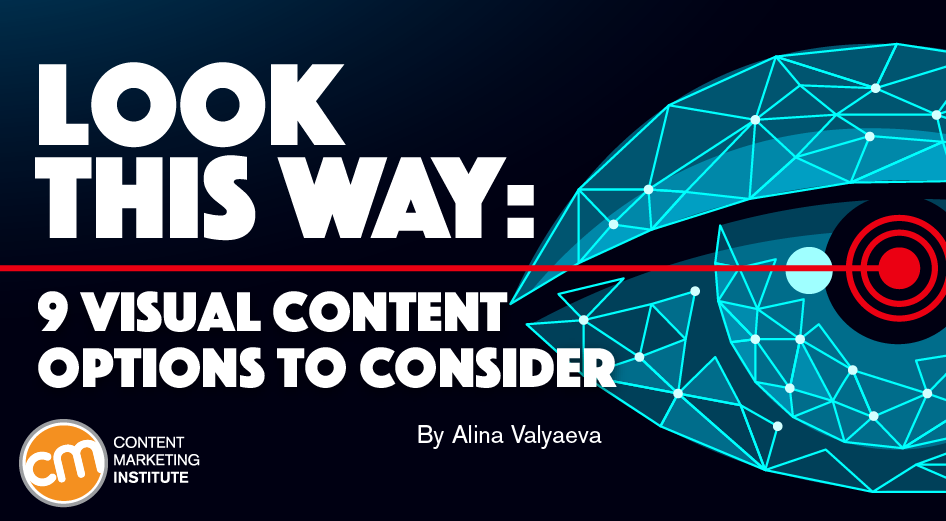 This post was co-written by Anastasia Stolyarchuk.
This post was co-written by Anastasia Stolyarchuk.
Yes, visuals help your content attract more viewers.
On social media, visuals boost engagement – 2.3 times more than posts without visuals on Facebook and 1.5 times more for tweets, as BuzzSumo research shows. It also reveals blog posts with a visual every 75 to 100 words earn more shares.
Visuals get more engagement than text only: 2.3x on #Facebook and 1.5x on #Twitter, according to @BuzzSumo #research, says @Everypixelcom via @CMIContent. Click To TweetBut simply adding a visual isn’t enough. It must be meaningful and relevant to your brand and audience. And it must wow – or at least impress – your audience.
To help pick the right visuals to help your content, read on for nine options and some illustrative examples to serve your content marketing goals.
1. Static visuals
Audiences are overloaded with information. Bite-sized pieces of it in an image with brief text like cards or infographics will draw their attention. In this example, Socialinsider partnered with Bannersnack to illustrate its finding on Instagram carousel posts and they presented the results in their own carousel:
2. Animated visuals
Scrollytelling is an interactive way to tell a story using the scroll feature to hold the reader’s attention. Visuals change as the user scrolls, adding a deeper layer of meaning. It’s also helpful to facilitate understanding for difficult topics like machine learning, as illustrated in this scrolling piece. (Since we can’t recreate the scrolling effect, these two images reflect two subsequent screens in the scrollytelling.)


3. Explainer videos
Short videos are popular and useful in explaining a singular topic or concept. In its Netflix show, Explained, Vox uses lots of animation and infographics and mixes visuals from different sources. They enable more information to be received in less time than an all-text explanation.
4. Authentic pictures
Too polished, plastic visuals dominate some social feeds. Stand out with visuals showing authentic situations and emotions. Your audience will be better able to associate themselves with your brand.
We often point to the brand Dove’s use of ordinary people to drive the message that beauty has a broad definition. Recently, its Courage Is Beautiful campaign used photos of health care workers after removing their protective gear.
5. Retelling stories
Authentic storytelling done differently by using visuals also can hook users in for more than a few seconds. The New York Public Library created Insta Novels – visualizing five iconic novels for Instagram Stories. Each edition included the full text along with illustrations and animated text. It even included a place to pause on every page for readers who didn’t finish the text in the 15-second view time before Instagram moves to the next one. These visualized novels gained more than 300,000 views and added more than 140,000 followers to the library’s Instagram account.

6. Behind the scenes
In their videos, Dior reveals how their clothes are made. These stories highlight the uniqueness of a luxury brand while reaching a wider audience.
7. Photo and video collages
Easy to create and catch attention with small details, collages are effective. They also can be a way to create a new visual by using images or videos you already have (or have access to.)
Take a look at how clothing brand Balenciaga used a collage concept to create this TikTok video. The illusion merges real and virtual worlds. It is hard to look away.
@balenciaga♬ Cocoa – Dragon Tears
Art studio Feltzine tells the story of a day in the life of an artist in an eccentric and stylish TikTok video. They used a bright palette, a combination of different shots, and optical illusions. And it paid off. One viewer commented, “I’ve watched this about 60 times”.
@feltzineDigital Mess 😤 #artwork_daily #augmentedreality #donaldtrump #arty (Douwe Djikstra) #tiktokindia #tiktokjapan♬ original sound – FeltZine
8. Flat lays
Flat lay photography involves shooting from above items on a flat surface. Some might say they are basic and overused, especially on Instagram and Pinterest. However, done well, it can tell a story or create a vibe. This example is one my company, Everypixel, created.
![]()
9. Stop-motion animation
This animation technique goes frame by frame to illustrate a moving object – using up to 30 images for a one-second video. A relatively fresh format for visual content marketing, production can be faster and cheaper compared to other video types. This example comes from watch manufacturer Bamford:
Think and act visually
MIT researchers say the human brain can process images seen for just 13 milliseconds. Combining pictures with text and audio makes the information easier to understand and remember. But just using visuals won’t work. To successfully connect with an audience, you need to know who they are and what they want. The right tone of voice and visual identity are crucial to build a strong visual content strategy that will lead your brand to success.
Cover image by Joseph Kalinowski/Content Marketing Institute

